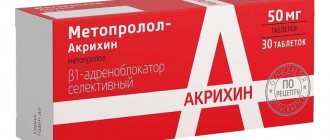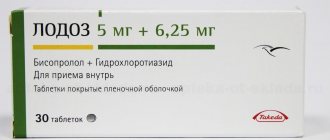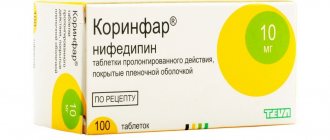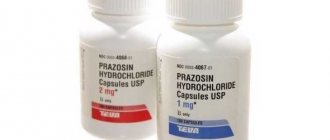General information about the drug
Lisinopril is a drug that belongs to the class of angiotensin-converting enzyme (ACE) inhibitors. The medication is prescribed for hypertension of varying severity. The medication is taken alone or in combination with other antihypertensive drugs.
The drug is allowed to be taken by patients with chronic heart failure and acute myocardial infarction at the initial stage of treatment.
Release form and packaging
The drug Lisinopril for blood pressure is produced in the form of tablets. Round flat tablets can be of 4 colors: dark orange, orange, pink, white. The color depends on the amount of the active ingredient Lisinopril in the composition. The minimum dosage of Lisinopril per tablet is 2.5 mg. The 2.5 mg tablet is dark orange. The maximum dosage of the component is 20 mg per white tablet.
Each tablet is packaged in an individual blister cell. One blister contains 10 or 14 tablets. Blisters are packed in a cardboard box. In total, the package can contain from 10 to 60 tablets. The kit includes instructions for using Lisinopril.
Lisinopril packaging
Compound
The main active ingredient in blood pressure tablets is lisinopril.
Other components of the drug:
- magnesium stearate;
- dyes;
- talc;
- corn starch;
- polyvinylpyrrolidone;
- lactose monohydrate;
- microcrystalline cellulose;
- polysorb.
Price and terms of sale
The blood pressure drug Lisinopril is sold in pharmacies with a prescription from your doctor. The price of Lisinopril depends on the number of tablets in the package and dosage. The average cost of tablets is 60 rubles.
Storage conditions
The blood pressure medication Lisinopril must be stored out of the reach of children at a temperature not exceeding 25 degrees.
The shelf life of the drug is 3 years from the date of manufacture. After the expiration date, tablets cannot be taken; they must be disposed of in accordance with sanitary standards.
Indications
The presented product has vasodilating properties. Therefore, it is ideal for combating high blood pressure when it comes to hypertension. When completing the entire therapeutic course, the heart muscle improves its function, blood circulation is activated, and excess sodium salts begin to be eliminated from the body. The drug Lisinopril reduces and normalizes systolic as well as diastolic parameters, without affecting the heart rate itself.
The medicine is available in tablet form. In this case, the dosage of the drug may be different. The following variations are found, depending on the amount of the main substance, lisinopril dihydrate:
- 2.5 mg (orange tablets);
- 5 mg (the color of the drug is pale orange);
- 10 mg (pink tablets);
- 20 mg (white medicine).
The cost itself will depend on the dosage of the drug, as well as on the number of tablets. Usually the price ranges from 70-200 Russian rubles (30-84 hryvnia). Lisinopril is prescribed for high blood pressure and arterial hypertension. Indications for the use of this drug may include acute myocardial infarction, chronic heart failure, and serious damage to the nervous system caused by diabetes.
Pharmacokinetic features
The drug Lisinopril belongs to the group of angiotensin-converting enzyme inhibitors. The medication lowers blood pressure by blocking the conversion of angiotensin 1 to angiotensin 2, which constricts blood vessels. The blood vessels dilate, lowering blood pressure levels.
The drug begins to act an hour after administration. The maximum concentration is reached after 6-7 hours. The effect of one tablet lasts for 24 hours.
When taken for a long time, the drug helps with blood pressure. The medicine has a prolonged effect. Taking Lisinopril tablets reduces mortality from heart attacks.
The bioavailability of the drug is 25%. Eating does not affect the absorption of the drug. Interaction with blood proteins is low. The half-life of the drug is 6 hours. Metabolites are excreted unchanged through the kidneys.
In elderly patients over the age of 65 years, the content of components in the blood increases, so it is necessary to monitor the condition of the kidneys and adjust the dosage.
Mechanism of action of ACE inhibitors
Pharmacological action of Lisinopril
Lisinopril is an ACE inhibitor, which helps reduce the formation of angiotensin 1 and angiotensin 2. When the process of reducing angiotensin 2 occurs, the release of aldosterone and bradykinin decreases, and the synthesis of Pg also increases.
Lisinopril is used to reduce peripheral vascular resistance, blood pressure and reduce pulmonary capillary pressure. In addition, the drug helps to increase myocardial tolerance to heavy loads in patients with CHF and dilates the arteries.
With long-term use of the drug, the patient's walls of resistive arteries improve. At the same time, Lisinopril helps improve blood supply to the ischemic myocardium. ACE inhibitors are intended to prolong the life of patients with CHF and slow down LV dysfunction in people who have suffered a myocardial infarction.
The maximum therapeutic effect occurs after 6-7 hours. The duration of action of the drug is 24 hours. If the patient has arterial hypertension, the effect is visible a few days after the start of treatment. A stable effect will occur in 1-2 months.
Pharmacodynamics: at what pressure to take
The main active component of the drug Lisinopril is an angiotensin-converting enzyme inhibitor. Lisinopril inhibits the active activity of ATP. When the enzyme decreases, aldosterone levels decrease. When the mineralocorticosteroid hormone of the adrenal cortex decreases, pressure readings decrease.
Lisinopril lowers blood pressure. The therapeutic effect of the drug is not limited to a decrease in blood pressure. The complex drug quickly has a broad positive effect on the cardiovascular system and organ function:
- reduces total peripheral vascular resistance;
- reduces cardiac preload;
- increases the volume of circulating blood per minute;
- increases the endurance of the heart muscle during high physical activity.
Lisinopril tablets dilate blood vessels and arteries, but do not lead to venous expansion.
With a long course of taking the drug for blood pressure, myocardial hypertrophy decreases and the nutrition of cardiac tissue improves.
Taking Lisinopril tablets prolongs the life of patients with pathological disorders of the heart and blood vessels, as well as after a heart attack.
Side effects
The cardiovascular system may respond to the use of the drug with the following side effects: a strong and persistent decrease in blood pressure, pressing chest pain and arrhythmia.
Many patients report migraines, dizziness, constant fatigue, and excessive sleepiness.
The digestive system is also sensitive to the action of the medicine: there is a change in taste, dry tongue, diarrhea and diarrhea. In some cases, swelling is observed. Renal dysfunction often occurs, including renal failure. A rash and hives may appear on the skin.
The appearance of side effects does not mean that you should stop taking it. Over time, symptoms may disappear, and this may also be caused by incorrect dosage or combination with other medications.
There is information about cases where patients undergoing hemodialysis while taking medication at the same time suffered from anaphylactic shock in the future.
What does Lisinopril help with?
Indications for the use of the drug Lisinopril are:
- hypertonic disease;
- chronic heart failure;
- diabetic glomerulosclerosis.
Lisinopril for high blood pressure is prescribed as a monotherapy or as part of complex therapy. The medication is prescribed to prevent myocardial infarction.
The medicine is prescribed to patients with cardiovascular diseases
Indications for use
The drug is available only with a doctor's prescription, as it is considered a complex and potent drug. The medication can be taken at almost any age. Lisinopil tablets help with:
- diabetic nephropathy;
- chronic heart failure;
- acute heart attack without a decrease in blood pressure;
- systematically increased blood pressure.
The drug has a cumulative effect, but the therapeutic manifestation of its action can be observed already on the day of the first dose.
Contraindications for use
The highly effective blood pressure drug Lisinopril has a number of contraindications:
- individual intolerance to components;
- Quincke's edema;
- period of bearing a child;
- breastfeeding period;
- problems with digesting food, disturbances in the gastrointestinal tract;
- hypolactasia;
- primary lactase deficiency;
- children under 18 years of age.
Take the drug with caution if there are relative contraindications:
- aortic stenosis;
- decreased blood flow in the renal arteries;
- condition after kidney transplant;
- Conn's syndrome;
- hypotension;
- decrease in circulating blood volume.
Before taking Lisinopril to lower blood pressure, you must read the instructions. The decision to prescribe tablets is made by the attending physician after examination and the balance of possible benefits and the degree of risk to health.
Contraindications
Lisinopril should not be taken in the following conditions:
- hypersensitivity to components;
- bearing a child, lactation;
- childhood, adolescence;
- Genetic Quincke's edema;
- angioedema.
With special care, the drug Lisinopril is prescribed for aortic stenosis, azotemia, diabetes mellitus, cerebrovascular diseases, increased potassium concentration, renal failure, low blood pressure, cardiomyopathy.
Laboratory studies of the drug
Studies of the drug Lisinopril under pressure were carried out on rats. Taking the medication does not lead to the formation of malignant tumors, mutations or intoxication.
Scientists tested the drug for fertility. Studies have shown that the drug does not have a negative effect on libido or potency.
The medication should not be taken during pregnancy and lactation, as studies have shown that this can lead to oligohydramnios, delayed fetal development or poisoning of the body.
Lisinopril can only be taken as prescribed by a doctor.
How to take Lisinopril tablets correctly
The blood pressure drug Lisinopril can only be taken as prescribed by a doctor. Before drawing up a treatment regimen for hypertension with Lisinopril, the doctor will conduct a comprehensive examination, collect tests, determine the clinical picture of the disease and take into account the individual characteristics of the patient’s body.
General recommendations
Tablets are taken 1 time per day. Doctors recommend drinking Lisinopril for high blood pressure in the morning before breakfast at the same time. Do not crush, crush, dissolve, chew or break the tablets. The tablet is taken whole with a sufficient amount of drinking water. Eating does not affect the time or order of intake.
Dosages
The doctor selects the dosage of Lisinopril for blood pressure individually depending on the disease and condition of the patient:
- For hypertension, the initial daily dosage is 10 mg. In the future, the dose can be gradually increased to achieve the desired therapeutic effect. The maximum daily dose for hypertension is 40 mg. A pronounced therapeutic effect will be achieved 2-3 months after the start of treatment. In the first three months, the doctor may additionally prescribe other antihypertensive drugs to normalize the patient’s condition.
- For chronic heart failure, the minimum daily dosage is 2.5 mg. Gradually, the doctor may increase the dosage if the prescribed dose does not bring the desired result. The maximum daily dose for CHF is 20 mg.
- For diabetic nephropathy, the daily dosage is 10 mg, which the doctor can increase to 20 mg if necessary.
- For renovascular hypertension, 2.5-5 mg of the drug per day is prescribed. During the course of treatment for hypertension, it is necessary to monitor blood pressure.
You cannot independently change the dosage prescribed by your doctor.
Analogs
For blood pressure, Lisinopril has several substitutes that are similar in composition, indications for use and contraindications. Here are the main analogues and replacements for this medication:
- Lysitar;
- Equator;
- Diroton;
- Zonixem;
- Iruzid;
- Lizoril;
- Sklpril;
- Dapril.
Before using any imported or domestic drugs, you need to consult a doctor who will select the best option for treatment. If you are faced with a choice of the effectiveness of the drug Lisinopril or Lorista or Ramipril, then you should still understand that these drugs are so similar to each other that only a personal survey of the patient can tell how suitable this or that drug is for him.
Recommendations and special instructions
Before taking Lisinopril for hypertension, you must carefully read the instructions.
Special instructions for taking Lisinopril for high blood pressure:
- Before starting therapy with Lisinopril tablets, it is necessary to check the levels of sodium and potassium in the blood; during drug therapy, it is necessary to monitor the indicators.
- A few days before taking Lisinopril, you must stop taking diuretics, otherwise your blood pressure may drop to critical levels.
- If you have reduced kidney function accompanied by myocardial infarction, you should not take Lisinopril for high blood pressure.
- Lisinopril tablets may cause anaphylaxis in hemodialysis patients.
- Before the upcoming operation, you must inform the surgeon about taking Lisinopril so that the doctor can adjust the anesthesia and eliminate the risk of a strong decrease in blood pressure.
- Lisinopril tablets should not be taken simultaneously with alcohol. Alcoholic drinks can cause a severe drop in blood pressure.
- Elderly patients should take the drug with caution and monitor their condition; if their health worsens, they should immediately consult their doctor.
- The medication does not have a negative effect on brain activity.
During the course of taking the drug, you must be careful when driving or performing work that requires concentration, especially if adverse reactions from the nervous system occur.
Overdose
When using a high dosage of the drug, an overdose of Lisinopril occurs. The condition is characterized by the following symptoms:
- acute hypotension;
- low heart rate;
- exacerbation of renal failure;
- hyperventilation;
- cardiopalmus;
- impotence;
- cough;
- changes in the level of electrolytes in the blood.
In particularly severe cases, the drug causes shock and death. For severe hypotension, a person is given saline in combination with symptomatic treatment. If any signs of an overdose of Lisinopril appear, therapy is discontinued. When taking a large portion of the drug, urgent hospitalization is required. Hemodialysis is highly effective.
Adverse reactions
Lisinopril blood pressure tablets are well tolerated by patients, but the occurrence of adverse reactions of the body from the functioning of internal organs and vital systems is possible.
Common side effects:
- heart and blood vessels: a significant decrease in blood pressure in the first days of use, orthostatic collapse, increased heart rate, chest pain, development of heart failure, acute myocardial infarction, rapid heartbeat, cardiac conduction disorders;
- digestive system: dry mouth, loss of appetite, taste disorder, pancreatitis, hepatitis, jaundice;
- central nervous system: causeless and frequent mood swings, loss of concentration, sensitivity disorder, clouding of consciousness, sleep disturbances, convulsions, asthenia;
- hematopoietic system: leukopenia, neutropenia, anemia, thrombocytopenia;
- urinary system: impaired renal function, hypouresis, complete cessation of urine secretion into the bladder, kidney failure, presence of protein in the urine, impotence;
- respiratory organs: cough, bronchial constriction, dyspnea;
- musculoskeletal system: myalgia, arthralgia;
- allergic reactions: Quincke's edema;
- blood counts: increased bilirubin, uric acid, urea, creatinine.
If you experience any adverse reactions to the drug, you must stop taking the pills and inform your doctor.
Common side effects include decreased blood pressure and drowsiness.
Side effects
The use of minimal effective doses of the drug is usually well tolerated and does not lead to side effects. In most cases, the side effects are mild and go away on their own.
- Headache, dizziness.
- Nausea, less often vomiting.
- Pain in the abdomen, loose stools.
- Weakness, increased drowsiness.
- Dry cough.
- Arrhythmias, critical decrease in blood pressure.
- Sweating.
- Itchy skin, urticaria.
- Swelling of the larynx, difficulty breathing.
- Anaphylactic shock.
- Muscle pain.
- Delayed urine output (anuria, oliguria).
- Fever.
- Depression of consciousness.
Hyperkalemia, azotemia, increased levels of bilirubin and liver enzymes are observed in the blood. If side effects occur, you should stop taking the drug and consult a doctor.
Lisinopril overdose
If the dose is exceeded, the patient may experience characteristic symptoms:
- severe decrease in pressure;
- dry mouth;
- urinary retention;
- difficulty defecating;
- kidney failure;
- disturbance of water-electrolyte metabolism;
- tachypnea;
- increased heart rate;
- causeless anxiety;
- dizziness;
- increased nervousness.
If there are signs of an overdose, you must rinse your stomach, take an adsorbent and consult your doctor. The doctor will prescribe symptomatic treatment.
Drug compatibility
The blood pressure medicine Lisinopril should not be taken with certain medications, as this may lead to increased adverse reactions or other negative consequences. Any medications you are taking should be reported to your doctor before starting Lisinopril therapy.
Taking Lisinopril tablets with potassium-sparing diuretics, potassium-containing drugs, and salt substitutes can lead to an increase in potassium concentrations in the blood.
Simultaneous use of Lisinopril with beta-blockers, calcium antagonists, and diuretics will lead to increased hypotensive effects.
Reactions to taking Lisinopril tablets with non-steroidal anti-inflammatory drugs:
- decreased antihypertensive effect;
- renal dysfunction;
- increase in potassium concentration in the blood.
Estrogen-containing and adrenomimetic drugs reduce the antihypertensive effect of Lisinopril tablets.
When taking Lisinopril tablets simultaneously with gold preparations, undesirable reactions of the body may occur: facial flushing, vomiting, a significant decrease in blood pressure.
Lisinopril: instructions for use for blood pressure, analogues
At what blood pressure should you take Lisinopril?
What does it help with? What dosage should be followed? Are blood pressure pills Lisinopril effective for hypertension? Similar questions are asked by people who are faced with arterial hypertension. Today we’ll talk about a drug that belongs to the group of ACE inhibitors. Since taking medication leads to dilation of blood vessels, Lisinopril for hypertension will become an indispensable assistant in the fight against the disease.
The drug does not affect the heart rate and effectively reduces systolic and diastolic pressure.
Content:
Release form of Lisinopril Pharmacological action of Lisinopril for high blood pressure Indications for use How to take for high blood pressure: instructions Contraindications, precautions Side effects Overdose symptoms Analogues of the drug Lisinopril Reviews from patients
Pharmacological companies produce Lisinopril in the form of tablets with different dosages: 5 mg, 10 mg and 20 mg. One package may contain 20, 30, 50 or 60 tablets.
The active substance is lisinopril dihydrate, and the auxiliary components are milk sugar, pregelatinized starch, talc, magnesium stearate and colloidal silicon dioxide (Aerosil).
This drug, as already mentioned, belongs to a group of drugs whose work is aimed at inhibiting the action of angiotensin-converting enzyme (ACE). The main effect of Lisinopril, which has hypotensive, vasodilating, cardioprotective and natriuretic effects, is to reduce the transformation of angiotensin-1 to angiotensin-2.
Lisinopril stimulates the formation of prostaglandins, reduces the degradation of bradycardin and reduces the amount of aldosterone released. As a result of these pharmacological properties, the drug reduces blood pressure to acceptable values, increases the volume of blood pumped by the heart per minute, reduces the strength of peripheral resistance of blood vessels, and increases the resistance of the heart muscle to functional stress.
Lisinopril also reduces pressure in the capillaries of the lungs. With long-term use, hypertrophy of the walls of the arteries and myocardium decreases. It is also worth paying attention to the fact that Lisinopril helps eliminate sodium salts from the body.
The maximum pharmacological effect of Lisinopril tablets is observed two weeks after the start of drug therapy. If no result is observed in the treatment of hypertension, then the drug is combined with other antihypertensive drugs.
It is not recommended to use Lisinopril tablets if systolic pressure is below 100 points.
Let us recall that high normal blood pressure is characterized by indicators of 130-139/85-98, the first degree of hypertension is 140-159/90-99, the second is 160-179/100-109, and the third is 180/110 mm Hg. Art.
The antihypertensive effect is observed after 1-3 hours from taking the tablet, and the peak occurs after 6 hours. The duration of the hypotensive effect is recorded during the day. A stable effect of the drug is observed in the second or third week of treatment.
In case of abrupt withdrawal from the drug Lisinopril, a sudden increase in blood pressure is not observed, as well as an increase in the levels that were before the start of therapy.
Dilation of arterioles and veins can reduce blood pressure with Lisinopril by 15%. The bioavailability of the drug after oral administration reaches 29%. This indicator is not affected by the functional state of the liver. Eating does not correct the absorption of the medication. The active substance Lisinopril, while in the human body, is not metabolized. It is excreted unchanged in the urine.
Lisinopril is recommended to be taken if the patient is faced with:
- arterial hypertension;
- high blood pressure of various etiologies;
- failure of the heart muscle (chronic);
- myocardial infarction (exacerbation stage);
- damage to the peripheral nervous system, which was caused by diabetes.
Since the persistent therapeutic effect of the drug Lisinopril occurs after 2-4 weeks of use, it is not used during a hypertensive crisis in order to quickly reduce blood pressure. Since the medication has a prolonged effect, it is enough to take a tablet once a day. It is better to do this in the first half of the day, with a sufficient amount of liquid (100 ml). The doctor must prescribe a treatment regimen, taking into account the patient’s age and the presence of various chronic diseases.
For arterial hypertension, if the patient is not taking other antihypertensive drugs, Lisinopril is prescribed 5 mg 1 time per day. If there are no side effects, the dosage is increased over the next three days by 5 mg. A dosage of 20 mg can support drug therapy for hypertension. The maximum permissible daily dose of the active substance is 40 mg. If the patient is taking diuretic tablets, then they should be discontinued, and Lisinopril should be taken only after three days (initial dosage 5 mg). During the first hours after taking the drug, observation by the attending physician is recommended.
Lisinopril for renovascular hypertension is taken 2.5-5 mg at a time every 24 hours. Regular monitoring of blood pressure, potassium concentration in the blood, and kidney function is carried out. In case of long-term therapy, the dosage is prescribed individually. Elderly patients are prescribed a dose of 2.5 mg.
In case of renal failure, if creatine clearance reaches 30-70 ml per minute, Lisinopril is taken at a dose of 5-10 mg. When the CC is 10-30, then the blood pressure remedy is taken at a dose of 2.5-5 mg per day.
In the case of diabetic nephropathy with constant use of insulin, Lisinopril is prescribed 10 mg per day, and in case of complications - up to 20 mg.
In the treatment of myocardial infarction, Lisinopril is used in complex therapy. Reception begins with 5 mg, then 10 mg per day is maintained.
Lisinopril for low blood pressure is prescribed 2.5 mg. In consultation with a doctor, the dosage can be increased to 5 mg, gradually lowering it to the minimum values.
The drug Lisinopril is contraindicated in cases where the patient is faced with:
- mitral valve stenosis;
- severe form of hypertension;
- edema (angioneurotic, angioedema);
- hypersensitivity to things that inhibit the action of ACE;
- pregnancy (especially in the 2nd and 3rd trimester);
- lactation.
In the latter case, if taking Lisinopril is necessary, the child is transferred to artificial feeding.
Precautionary measures include:
- coronary insufficiency;
- coronary heart disease;
- renal failure;
- diabetes;
- advanced age;
- a diet with limited salt intake.
Before starting drug therapy, you should consult with your doctor to find out at what pressure you should take Lisinopril and what dosage to follow.
If the dosage and the correct treatment regimen are followed, the negative consequences after taking Lisinopril usually disappear within a few days. However, it is important to know what side effects a patient may experience. This is about:
- a sharp decrease in blood pressure;
- unproductive cough;
- pain in the chest area;
- disturbances in the functioning of the gastrointestinal tract;
- nausea and vomiting;
- joint pain;
- migraines and dizziness;
- muscle weakness;
- increase in erythrocyte sedimentation rate;
- deterioration of potency in men;
- decreased hemoglobin levels;
- increasing the level of keratin and urea nitrogen;
- the appearance of allergic reactions (skin rashes).
During the medication course, the intake of drinks and medications containing ethanol is excluded. The fact is that Lisinopril enhances the negative effects of alcohol on the body. Ignoring this recommendation can lead to problems with liver function.
How does Lisinopril interact with other drugs? To exclude undesirable consequences, the medicine is not taken simultaneously with potassium-sparing diuretics, antacids, sympathomimetics, adrenostimulants, indomethacin, antipsychotics, quinine.
In case of excessive intake of lisinopril dihydrate, the patient risks experiencing tachycardia, a sharp decrease in pressure, and relaxation of vascular smooth muscles (peripheral). To provide first aid, the victim’s stomach is washed, activated charcoal is given, and the patient is placed on his back so that his legs are higher than his head.
When there is a sharp decrease in blood pressure, Dopamil is used. It is important to pay attention to the fact that hemodialysis in the described situation is ineffective. In case of an overdose of Lisinopril, you should seek medical help from a specialist as soon as possible.
Like the first-generation inhibitor Captopril, the drug Lisinopril is a group of direct-acting medications. Other antihypertensive drugs acquire their active form as a result of metabolism. Therefore, it is not advisable to consider them as an analogue of Lisinopril due to different pharmacodynamics.
Medicines with similar effects include:
- Scopril;
- Lizoril;
- Diroton;
- Lizopres;
- Lizonoton;
- Vitopril;
- Dapril;
- Lisinovel;
- Irumed.
Tatyana, 42 years old
My father is hypertensive. Arterial hypertension did not escape me either. Recently, the pressure began to rise to 160/100. I consulted with my local therapist. The doctor said that it was better not to waste time and start treatment. To control the disease in the early stages, I selected effective treatment. Prescribed to take Lisinopril blood pressure pills daily at a dosage of 5 mg (once a day). For a beginner hypertensive patient, this amount, as the doctor noted, will be enough. The first few days I didn’t feel any special effect. After a week, the pressure did not rise above 135/90. To be honest, it is not difficult to take one pill every day to live a normal life. I don't see any side effects. I was convinced that Lisinopril lowers blood pressure.
Larisa, 38 years old
At the age of 29, I found out that I have stage 3 hypertension. I was in the hospital, my blood pressure was reduced with injections and medications. At times it increased to 240/160. I tried different pills, but nothing really helped. A female pharmacist advised me to use Lisinopril for blood pressure. The first three days I took 10 mg 3 times a day. Blood pressure dropped to 160/120. After a month of use, I reduced the daily dose to 10 mg. My blood pressure became stable and stayed at 140/100. Heart function has improved. I have been taking the drug for 7 years. Everything is completely satisfactory. The only negative is the appearance of depression.
Maria, 53 years old
I took blood pressure pills (ACE inhibitor group) for a long time. I started to have a cough. Frustrated because you didn’t know what to do in this situation? The drug was good, I didn’t want to give it up. The doctor recommended Lisinopril. Switched to him. At first, blood pressure readings were unstable. The pressure dropped to normal levels only after two weeks. I started taking it once a day regardless of food. Within three days I increased the dosage from 5 mg to 20 mg. This dose turned out to be more effective. I regularly measure my blood pressure, if it is lower than usual, then I take 10 mg per day. Dry cough no longer bothers me. And no side effects were noticed.
What should not be taken at the same time?
Some combinations are strictly prohibited and are considered contraindications. Lisinopril should not be combined with:
- antihypertensive drug Alixiren: increases the risk of hyperkalemia, renal failure, development of heart and vascular diseases, and death;
- muscle relaxant Baclofen: pressure readings may drop to critical values;
- antitumor drug Estramustine: Quincke's edema may develop;
- dipeptidyl peptidase 4 inhibitors: the risk of developing angioedema increases several times;
- sympathomimetic drugs: the effectiveness of Lisinopril tablets is reduced;
- tricyclics, antipsychotic drugs, general anesthesia: enhance the antihypertensive effect.
To lower your blood pressure with Lisinopril, you must follow your doctor's recommendations.
Regarding the compatibility of Lisinopril with other drugs, you should consult your doctor.
Interaction with other drugs
A strong hypotensive result is observed when combining the drug Lisinopril Farmland and thiazide diuretics. Absorption from the esophagus is reduced with additional intake of Cholestyramine and antacids. The risk of increased potassium in the bloodstream increases due to the use of potassium-sparing diuretics and medications with potassium. The antihypertensive effect decreases when taking estrogens, NSAIDs, and adrenergic stimulants.
There is a decrease in the resistance of the circulatory arteries and pressure in the arteries of the lungs when Lisinopril is combined with digitalis and diuretics. For heart failure and hypertension, sodium chloride reduces the effectiveness of the drug. Negative effects may occur when taking tablets with ACE inhibitors or gold pills.
The risk of inhibition of bone marrow hematopoiesis increases when using myelotoxic drugs. Additional use of oral hypoglycemic medications and insulin often leads to a decrease in glucose levels in the bloodstream. Diuretics, glycosides for the heart, together with Lisinopril, prevent the occurrence of unpleasant signs of long-term heart failure.
What can replace the original drug?
Analogues of Lisinopril with the same active ingredient in the composition:
- Diapril;
- Diropress;
- Diroton;
- Irumed;
- Lizonorm;
- Sinopril.
The most popular substitute for Lisinopril tablets is Captopril. The drug Captopril reduces hypertrophy of the ventricular walls and reduces the risk of developing heart failure. The absorption of Captopril is 75%. The medication is taken 2 times a day. Captopril has fewer contraindications and adverse reactions.
Lisinopril or Diroton - which is better?
Lisinopril is often compared to Diroton. These are active analogues with similar composition and therapeutic effects. The drugs are classified as antihypertensives, which are prescribed to lower blood pressure. Both medications are sold in tablet form.
Lisinopril and Diroton should not be prescribed during pregnancy or breastfeeding.
The difference in drugs is in the minimum daily dosage and manufacturer. The price of each drug varies: Diroton will cost 3-4 times more than Lisinopril tablets, so there is no point in changing Lisinopril to Diroton.
Lisinopril analogue
ACE inhibitor drugs act as an analogue of Lisinopril. It is not recommended to replace a medicine prescribed by a doctor without prior consultation with a specialist. The most famous analogues are:
- Vitopril;
- Dapril;
- Diroton;
- Zonixem;
- Irumed;
- Lisinovel;
- Lizinocol;
- Lipryl;
- Lizoril;
- Scopril;
- Prinivil.











